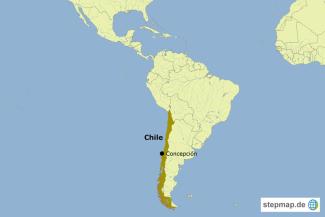Minorities
One country or several nations

Most Chileans are “criollos”, the descendants of white colonisers who were born on American territory, but around five percent of the population are indigenous people.
In spite of the tradition of praising national unity, the paradigm of “one nation” is now being challenged. The background is permanent tension between the central government and indigenous communities, in particular the Rapa Nui of Easter Island and the Mapuche, the largest indigenous group in Chile.
Extractive industries are confronting indigenous communities about land. The Mapuche claim that illegal land grabs started under the military dictatorship in the late 1970s. They say that communal indigenous land was robbed and given to private parties. Later, industries like mining, salmon fishing, forestry industry or hydo-electric power generation took over, destroying natural resources in huge areas.
State agencies have made matters worse, taking the side of business. Indigenous protesters regularly clash with the police. Cases of political violence are notorious, like the killing of Matías Catrileo, a young Mapuche student in 2008. In 2015, Mapuche petitioners even brought their grievances to the Inter-American Commission on Human Rights (IACHR).
Experts say that the long-term conflict between indigenous people needs a political rather than a merely legal or economic solution. It may make a difference that Chile is now in the process of drafting a new constitution. The reason is that the current constitution was written by the former military government, which had illegally grabbed power. According to President Michelle Bachelet, the constitution “does not promote democracy”. Currently, a “dialogue with the citizens” is underway. All Chileans, including the indigenous minorities, can take part in the process. The proposal for the new constitution is supposed to be finalised in 2017.
Fernando Pairicán is a historian who belongs to the Mapuche people. In his opinion, the fact that Chileans belong to different peoples should be reflected in the new constitution. Pairicán appreciates the idea of a plurinational state as is explicitly spelled out in Bolivia’s constitution which enshrines the rights of several peoples. In contrast, the mere idea of multiculturalism “neither questions the existing model nor does it contemplate autonomy,” Pairicán says.
Salvador Millaleo is one of the lawyers who supervise the drafting of the new constitution. “Today, the collective rights of indigenous communities count less than, say, the value of private property”, he says. “If the concept of ‘many nations’ is incorporated, it will radically change our view of the indigenous peoples and of the Chilean legal system.” In Chile, this debate is just beginning.
Javier Cisterna Figueroa is a journalist and lives in Concepción, Chile.
cisternafigueroa@gmail.com
Link
Mapuche International:
http://www.mapuche-nation.org/







